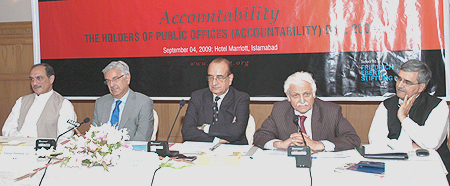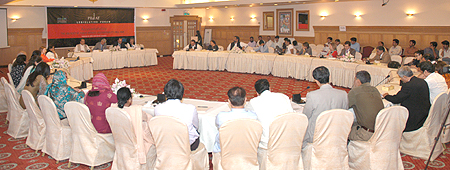|
|
| |
| EVENTS |
|
|
> The Holders of Public Offices (Accountability) Bill termed as Politically Suicidal for Politicians; a Careful, Detailed and Urgent Review Stressed
PILDAT holds Legislative Forum on Accountability: The Holders of Public Offices (Accountability) Bill 2009 |
|
|
| |
Speakers and subject specialists at the PILDAT Legislative Forum demanded a careful, detailed and urgent review of the Holders of Public Offices (Accountability Bill 2009) which is currently at the committee stage in the National Assembly. The PILDAT Legislative Forum on Accountability: The Holders of Public Offices (Accountability Bill 2009) was held on Friday, September 04, 2009 at Islamabad. |
|
| |
Key speakers at the forum included Mr. Shahid Hamid, Senior Advocate Supreme Court and former Governor of Punjab, Mr. Farhat ullah Babar, Spokesperson, President�s House, Khawaja Muhammad Asif, MNA, PML-N, former Federal Minister and General (Retd) Shahid Aziz, former Chairman National Accountability Bureau (NAB). MNAs, Senators, lawyers, media and subject specialists were part of the discussant panel that offered its analysis and recommendations at the forum.
|
|
| |
Introducing the topic, PILDAT�s Executive Director, Mr. Ahmed Bilal Mehboob said that according to PILDAT�s analysis of the bill contained in a PILDAT Legislative Brief widely circulated to Parliamentarians and the news media, the bill appears to be deficient on meaningful accountability provisions for the holders of public offices. All Corruption Offences are termed bailable by the Bill while a number of key International Commitments by Pakistan are flouted in the bill including the UN Convention Against Corruption (UNCAC). He said that as an organization committed to strengthening democracy and democratic institutions, we believe that a weak and inefficient mechanism of accountability of the holders of public office poses the greatest threat to democracy given Pakistan�s peculiar context in which democracy gets derailed every few years. PILDAT recommends the NA Committee on Law to hold Public Hearings on the Bill before it is finalized and passed. Mr. Mehboob said that accountability should not be used as a political slogan or political witch-hunt as previously experienced in the country therefore it was important for political government to introduce a non-political, objective and effective accountability law that could operate without political intrusion. |
|
| |
In his analysis, Mr. Shahid Hamid explained various provisions of the bill and their likely implications, highlighting issues he considered missing or flawed, in particular the narrow definitions of corruption and public official, as well as the short limitation period proposed. He questioned the absence of the office of Nazim from the definition of public offices in the bill as well as federal and provincial public servants and retired Armed Forces personnel. He questioned the narrow definition of corruption and suggested the settled definition of corruption should be used and public contracts should also be added to the purview of the bill. Comparing the bill to the earlier Ehtesab Ordinance and the NAB ordinance, he said that Ehtesab courts were at the level of high courts and their replacement with session courts may not be suitable given high public officials are the purview of the bill. He said that in addition to PILDAT�s analysis, the bill also flouts one of the requirements of Anti-Money laundering law as well where suspicious transactions have to be reported by the banks. Questioning the limitation period of 3 years, he said that it was a one of a kind provision which set a limitation as nowhere in the world felony or serious crimes are looked at in a limitation period only other than minor misdemeanor. |
|
| |
Mr. Farhat ullah Babar spoke passionately of the need for reform, citing the problems with the Ordinance and the operation of NAB, which he saw had been used as a political tool. He felt strongly that anti-corruption measures should be wider-ranging, covering the military and the judiciary. |
|
| |
Gen. (Retd.) Shahid Aziz spoke candidly of the need to retain the NAB Ordinance, with some amendments. He conceded that in its early years NAB had been used as a political tool. He however considered the new Bill to be �a license for a clean sweep of what is left of the assets of this country.� He recommended that the National Accountability Ordinance should be retained with suitable modifications; an all parties committee should be constituted to formulate the anti corruption policy and the leading personalities of media and a select group of citizens should be taken on board and immunity should be given to all echelons including and above Provincial Ministers and Grade 20 officials. |
|
| |
Khawaja Muhammad Asif also criticised the Bill, particularly in relation to the narrow strand of office holders covered and the short limitation period, and gave a public commitment by the PML-N not to pass the Bill in its current form. He was emphatic in terming the bill as a political suicide if the Parliament were to pass it in its current shape. |
|
| |
Key discussants at the Legislative Forum included Senator Zafar Ali Shah, Senator Prof Ibrahim, Senator Saeeda Iqbal, Senator Jamal Khan Leghari, Dr. Donya Aziz-MNA, Ms. Marvi Memon, MNA, Mr. Ijaz Virk-MNA, Mr. Shahid Khaqan Abbasi-MNA, Ms. Shakeela Khanam Rashid-MNA, Ms. Tahira Aurangzeb-MNA, Justice Fakhur Nisa Khokar-MNA, Dr. Moeed Pirzada, Mr. Kashif Abbasi and Mr. Sabir Shakir, etc. |
|
| |
|
|
| |
|
|
| |

|
|
| |
|
|
| |

|
|
|
|
|
|
|
|
|